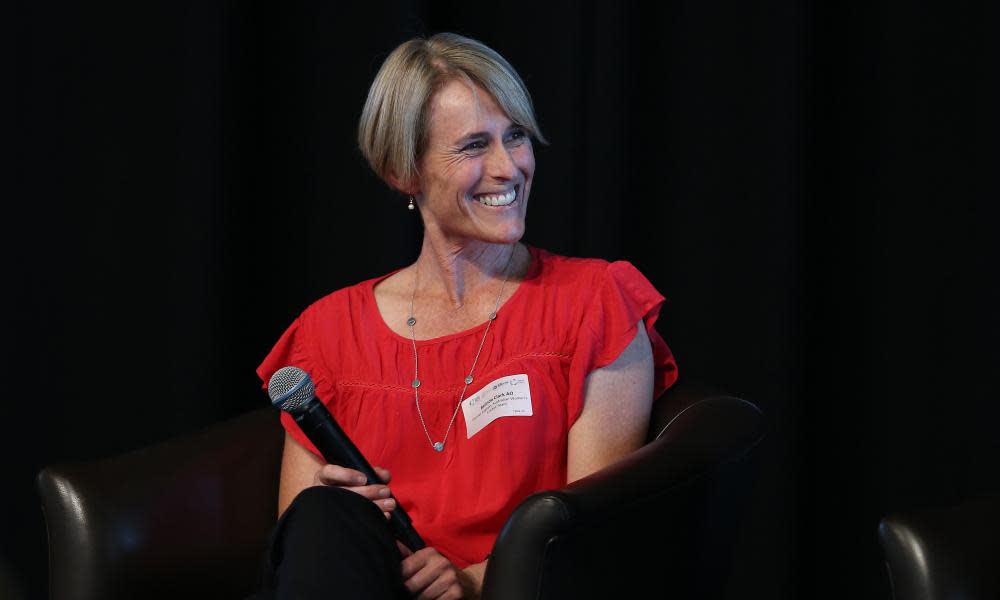'When she speaks, you listen': Cricket Australia braces for loss of Belinda Clark

On International Women’s Day this year, 86,174 people packed into the MCG to watch a game of women’s cricket, something unimaginable during Belinda Clark’s time as Australia captain. However, without her legacy and the work she did both during her playing days and after her retirement, this dream may never have become a reality.
This week Clark announced that she will step down from her role at Cricket Australia as executive general manager of community cricket on 30 November, although she will continue as a director of the local organising committee for the 2022 men’s T20 World Cup.
Related: Australia v New Zealand: third women's Twenty20 international – live!
A giant of the game, Clark holds a slew of impressive playing records. She remains the Australian women’s team’s highest ODI run scorer of all time, has the record for the most appearances as captain and was the first player, male or female, to score a double century in an ODI.
But it is off the field that she has had arguably the most impact, spending 20 years working with Cricket Australia in a variety of demanding administrative roles. Former Australia captain Alex Blackwell regards Clark as one of the most important figures of the sport in Australia.
“When Belinda Clark speaks, you stop and listen,” she said. “She’s very good at putting the message across clearly, firmly and with optimism. What she says makes sense and she follows through with it – you can see the change happening around her as a result of her leadership.”
Clark has long been a tireless advocate for women’s cricket, taking on the role of chief executive of women’s cricket Australia while still captaining the national team and seeing the women’s game through the merger with the Australian Cricket Board in 2003.
Being a women’s cricketer in Clark’s era involved a great deal of sacrifice – there was no monetary reward on offer and players had to juggle elite cricket with paid employment and were often heavily involved in grass roots cricket to ensure there were opportunities for the next generation of female players coming through the ranks.
Clark’s passion for community cricket has been evident for many years – from her own playing days as a child in Newcastle, through to her role as a development officer with Cricket NSW and into her current role steering community cricket programs and initiatives with the national body. Her belief in the power of cricket to change lives and empower young people made her a strong leader in this space.
One of the big developments she oversaw was the rule changes for junior cricket introduced in 2017, in which the length of pitches were shortened, boundaries brought in and more guaranteed batting and bowling time for younger players was factored in. Blackwell regards this as one of Clark’s greatest achievements as an administrator.
“She came in to run community cricket and she really revolutionised it,” Blackwell said. “She and her team analysed how we can do this better and came up with a research-based and really creative way to solve the problem and then were able to translate to all those hard-working volunteers how to make it work on the ground.”
Her time at Cricket Australia also included a stint as interim executive general manager of team performance following the exit of Pat Howard, where she faced the unenviable task of managing the reintegration of Steve Smith and David Warner following their suspensions from the sandpaper scandal. It is a position that could well have become a glass cliff – where a woman is afforded a leadership role in a crisis period when there is a higher likelihood of failure – but Clark navigated the situation with her trademark confidence and capability, reiterating her value to the organisation.
Known for her high standards – both for herself and those around her – Clark has always led from the front, determined to drive her team forward, whether that involves winning a World Cup, improving the culture of the sport or pushing for better outcomes in junior participation.
Her focus now turns to her own business, The Leadership Playground, which aims to build leadership skills for 10 to 15-year-old girls.
Related: Lisa Sthalekar: cricket hall of famer who has consistently broken down barriers | Melinda Farrell
“My dream is to help young girls develop the confidence, skills and courage to step forward when leadership opportunities arise,” she said on announcing her resignation from Cricket Australia.
“This shift in my focus is timely as we navigate through significant global challenges – many of which need strong local and diverse voices to overcome.”
Blackwell is excited to see where Clark takes this new initiative but believes her loss will be felt heavily in the sport.
“I feel sad we’re going lose her,” she said. “I feel like cricket has lost a really good person. It’s exciting for her but a little bit of a concern for cricket because we’ve now lost a few high performing women at the top end and there’s not many. If she’d wanted to, Belinda could have run the whole place.”

 Yahoo News
Yahoo News 
